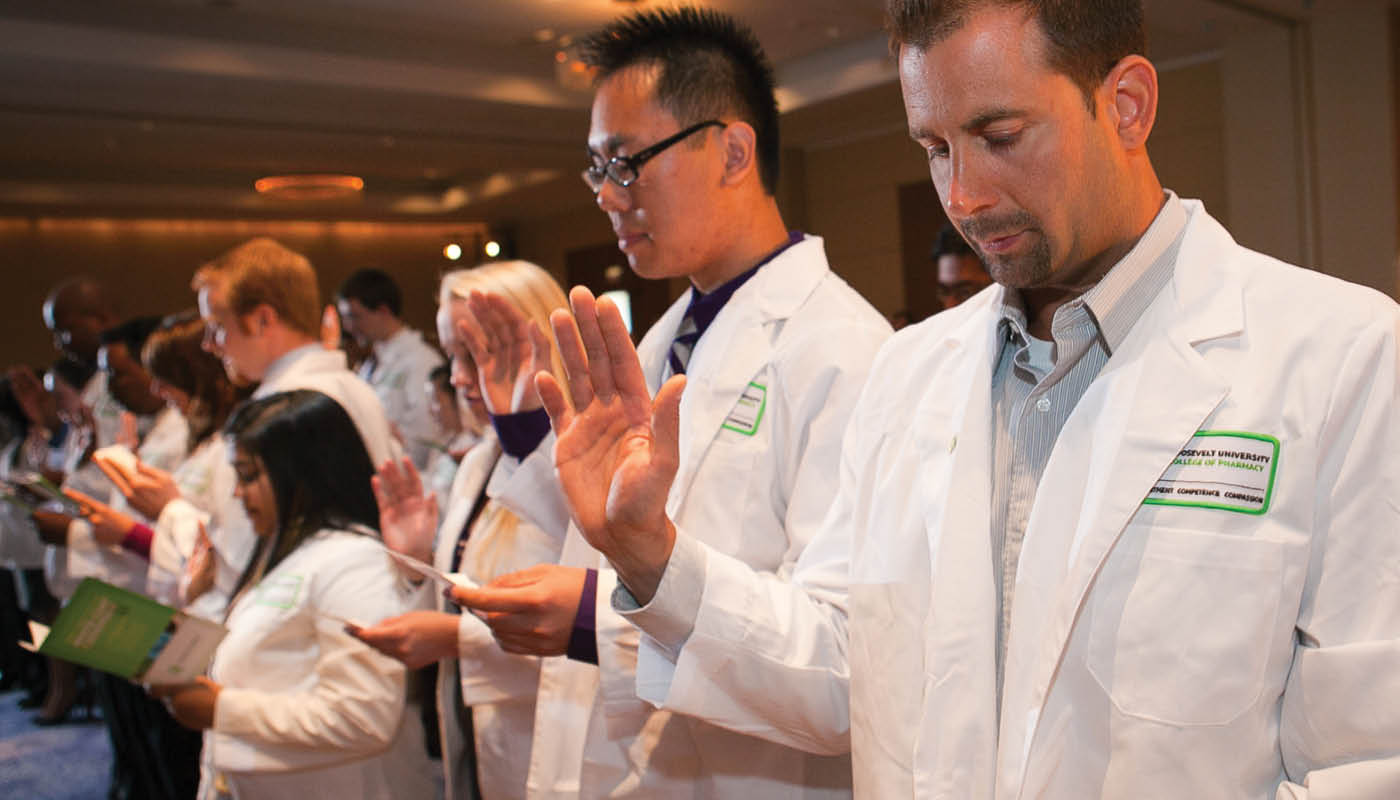
Ian Karall takes the pharmacist’s oath. Today, he is a pharmacy resident at Rush Medical Center in Chicago.
The dose was for 75 micrograms of the drug Synthroid, but it was a good thing that Ian Karall, during a hospital rotation as a Roosevelt University pharmacy student, called the patient’s daughter to double check.
“I don’t know whether the patient is still alive,” acknowledged Karall, who learned the elderly woman, while at home, had been taking 175 – and not 75 – micrograms of the thyroid drug that can cause the heart to race. “I do know that I felt pretty good about being able to catch a potentially life-threatening error.”
Thinking fast on one’s feet and trouble-shooting are among skills that Karall, winner of College of Pharmacy awards for excellence in academics and field practice, is honing this year as a pharmacy resident at Rush Medical Center in Chicago.
Six others from Roosevelt’s first graduating pharmacy class also landed residencies in hospitals in Illinois and Wisconsin. They are: Anthony Albiani, winner of the College of Pharmacy’s Commitment Award and resident at Milwaukee’s Wheaton Franciscan Hospital; Diane Cluxton and academic achievement award winner Kuntal Patel, residents at Mt. Sinai Medical Center in Chicago; Stephanie George, three-time College of Pharmacy award winner and resident at Ingalls Memorial Hospital in Harvey, Ill.; Gordana Milosevic, winner of the Compassion Award who received all As in her advanced practice experiences and a resident at Aurora West Allis Medical Center in suburban Milwaukee; and Nicholas Tillman, an academic excellence awardee and a resident at St. Francis Medical Center in Peoria, Ill.
“We are proud of our graduates who choose the residency path.”
College of Pharmacy Dean George Mackinnon
“We are proud of our graduates who choose the residency path,” said George MacKinnon, founding dean of the College of Pharmacy. “Residencies open doors to pharmacists interested in direct patient care, which is why these positions are in demand and can be most difficult to get.”
Residencies provide postgraduate education and training beyond the PharmD degree and are highly competitive. Nationwide this year there were 4,142 applicants for residencies, including 12 from Roosevelt and 2,640 students were matched with residencies, including seven from Roosevelt, according to the American Society of Health-System Pharmacists.
Although residencies pay a fraction of what new pharmacists can earn by going directly to work at places like Walgreens or CVS, they are invaluable for future jobs. “When students ask me whether residences are worth it, I challenge them to look at job postings and to find even one for pharmacists needed in clinical settings that doesn’t say ‘residency required,’” said Craig Cooper, assistant professor of clinical sciences at Roosevelt and an intensive care unit pharmacist at Northwestern Memorial Hospital in Chicago.
“It is virtually impossible to get a position in direct patient care working on medical teams in places like intensive care units or hospital emergency rooms without completing a residency,” he added.
Diane Cluxton, who chose Roosevelt’s College of Pharmacy program because of the University’s social justice mission, said she didn’t want her PharmD degree to be the end of her educational path. “I wanted it to be the beginning and I was fortunate to land at a hospital with a mission of helping the underserved,” said Cluxton, a resident at Mt. Sinai Medical Center where she also did advanced practice as a Roosevelt student. At one point, Cluxton successfully advised a patient who had confided being on heroin not to mix the illicit drug with blood thinner, and further convinced the patient to enter a methadone treatment program for heroin addiction.
“I’ve been able to learn to do a lot for people with limited resources, and I believe my residency is going to open doors for me,” said Cluxton, who hopes the experience will pave the way for her to teach or enter a specialty pharmacy practice.
“The fact that Roosevelt had seven students gain residencies is a great start,” said Cooper. “We have students in the Class of 2015 who are extremely talented and I believe many of them will land residencies as well.”
Leave a Reply